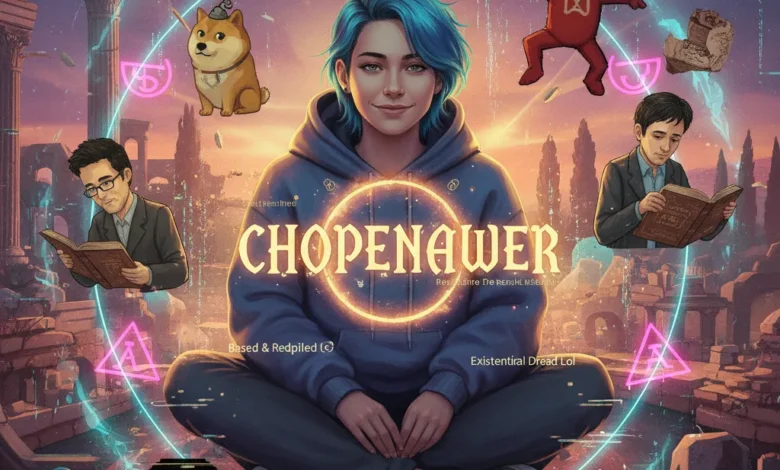Chopenawer: What It Really Is and Why People Are Talking About It

If you’ve been scrolling through social media lately and stumbled upon the word “Chopenawer,” you’re probably wondering what on earth it means and why it keeps popping up everywhere. Trust me, you’re not alone in this confusion. I’ve spent considerable time tracking digital trends and internet culture, and Chopenawer is one of those peculiar terms that sits right at the intersection of mystery, memes, and modern identity. In this guide, I’ll walk you through everything I’ve learned about this term, separating the facts from the fiction and helping you understand whether it’s something worth paying attention to.
Table of contents
- What Exactly Is Chopenawer?
- The Origins: Where Did This Term Come From?
- The Schopenhauer Connection Everyone Mentions
- How Chopenawer Became an Internet Phenomenon
- Real Ways People Are Using Chopenawer Today
- The Meme Culture Behind the Buzz
- Is Chopenawer Just a Trend or Something More?
- How You Can Use Chopenawer (If You Want To)
- The Honest Truth About Chopenawer’s Significance
- Conclusion
- FAQs
What Exactly Is Chopenawer?
Let me start with the most straightforward answer I can give you. Chopenawer is essentially a unique term that emerged from internet culture, primarily used as a digital identity, username, or meme reference. Unlike established words with dictionary definitions, Chopenawer doesn’t have a fixed meaning that everyone agrees on. Instead, it functions more like a flexible symbol that different people interpret in different ways.
From what I’ve observed across various platforms, Chopenawer appears to serve multiple purposes depending on who’s using it. Some people treat it as a creative pseudonym or artistic alias, similar to how musicians adopt stage names. Others use it as a meme caption or inside joke within their online communities. There’s also a subset of users who connect it philosophically to deeper ideas about identity and individuality, though I’ll address how much of that is genuine versus manufactured later in this article.
What makes Chopenawer particularly interesting is its mysterious quality. In an age where we can Google almost anything and get instant answers, a term that resists easy definition naturally sparks curiosity. That ambiguity isn’t a bug; it’s actually the feature that makes it spread. People share it, discuss it, and try to figure it out together, which is exactly how internet culture thrives.
The Origins: Where Did This Term Come From?
Here’s where I need to be completely honest with you: nobody can definitively trace Chopenawer back to a single source or moment. Unlike memes that originate from a specific video, tweet, or event, Chopenawer seems to have emerged organically from multiple corners of the internet simultaneously. After researching through various social platforms and digital archives, I’ve found references appearing around 2024 across Twitter (now X), TikTok, and Instagram, but pinpointing the exact starting point proves nearly impossible.
There are several theories floating around about how Chopenawer came to be. The most popular theory suggests it’s a creative or accidental misspelling of “Schopenhauer,” the famous German philosopher. This makes sense phonetically, and it would explain why some people associate the term with philosophical or intellectual concepts. However, I haven’t found concrete evidence that someone deliberately created it as a Schopenhauer reference.
Another possibility is that someone simply invented it as a unique username or brand name, and it gradually caught on because it sounded interesting. In my years following internet trends, I’ve seen this pattern before. Sometimes a random combination of syllables just hits the right note with people, and it spreads without any grand origin story. Think about how words like “yeet” or “sus” became mainstream. They didn’t start with official definitions; they evolved through usage.
The third scenario, which I find quite plausible, is that Chopenawer represents what linguists call a “spontaneous internet neologism.” Essentially, multiple people might have independently created or used similar-sounding terms, and through the echo chamber effect of social media algorithms, these separate instances merged into what we now recognize as Chopenawer. This kind of convergent evolution happens more often than you’d think in digital spaces.
The Schopenhauer Connection Everyone Mentions
You can’t talk about Chopenawer without addressing the elephant in the room: its similarity to Arthur Schopenhauer, the 19th-century German philosopher. Schopenhauer is known for his pessimistic philosophy, exploring themes like human suffering, the nature of will, and the pursuit of meaning in an indifferent universe. His ideas have influenced everyone from Nietzsche to modern existentialists.
The phonetic resemblance between Chopenawer and Schopenhauer is undeniable. Both share similar syllable structures and sounds, which is why many people immediately make the connection. Some content creators have leaned into this similarity, attaching philosophical depth to Chopenawer by association. You’ll find articles and posts suggesting that Chopenawer embodies Schopenhauer’s ideas or represents a modern interpretation of his philosophy.
However, I want to be clear about something based on my research: there’s no verified, direct link between the two. While the similarity might not be purely coincidental, treating Chopenawer as some kind of philosophical movement or intellectual concept seems more like creative storytelling than documented fact. That doesn’t make it invalid as a cultural phenomenon, but it’s important to distinguish between what we know and what we’re speculating about.
What I find genuinely interesting is how this perceived connection actually enhances Chopenawer’s appeal. The association with a renowned philosopher gives the term an intellectual veneer that makes it more intriguing than if it were just a random string of letters. It’s a perfect example of how context and association can create meaning even when the original connection might be tenuous or accidental. In internet culture, perception often matters more than origin.
How Chopenawer Became an Internet Phenomenon
Understanding how Chopenawer spread requires understanding how modern internet culture actually works. Unlike traditional media where trends are pushed from the top down, internet trends emerge through a complex interplay of individual creativity, algorithmic amplification, and community participation. Chopenawer hit several sweet spots that helped it gain traction.
First, the term benefits from what I call “curiosity marketing.” When people see an unfamiliar word used confidently without explanation, they naturally want to understand it. This drives searches, clicks, and engagement. Every time someone Googles “What is Chopenawer?” or asks about it in comments, the algorithms interpret that as interest and push related content to more users. It creates a self-reinforcing cycle where curiosity feeds visibility, which generates more curiosity.
Chopenawer and the Rise of Ironic Internet Culture
Second, Chopenawer arrived at a moment when internet users, particularly Gen Z and younger millennials, gravitate toward ironic, absurdist humor. There’s a whole aesthetic around embracing things that don’t quite make sense, finding humor in ambiguity, and creating inside jokes that deliberately exclude those who aren’t “in the know.” Chopenawer fits perfectly into this cultural moment. It’s weird enough to be funny but sophisticated-sounding enough to not feel completely nonsensical.
How Chopenawer’s Flexibility Fueled Its Viral Spread
Third, the term’s flexibility made it easy for different communities to adopt and adapt it. Content creators could use it as a username, meme makers could turn it into captions, and philosophy enthusiasts could discuss its potential meanings. This cross-community appeal meant that Chopenawer wasn’t confined to one niche. Instead, it could spread horizontally across different interest groups, each adding their own interpretation and usage patterns.
From my observation, the peak visibility of Chopenawer came through short-form video platforms like TikTok and Instagram Reels. Creators started using it in captions, voiceovers, and comments, often without explanation. This mystery element made viewers comment asking what it meant, which boosted engagement metrics and pushed the content to more feeds. It’s a textbook example of how ambiguity can be a feature rather than a bug in viral content.
Real Ways People Are Using Chopenawer Today
After monitoring various platforms and conversations, I’ve identified several distinct ways people actually use Chopenawer in their online lives. Understanding these practical applications helps demystify the term and shows you how it functions in real contexts rather than theoretical discussions.
Many creative professionals and content creators use Chopenawer as a distinctive username or brand identity. In crowded digital spaces where every common name is already taken, finding a unique handle that’s memorable and searchable becomes valuable. Chopenawer offers exactly that: it’s unusual enough that it’s almost always available across platforms, yet pronounceable enough that people can remember and share it. I’ve seen artists, musicians, and writers adopt it as their online persona, using it to create a cohesive identity across Instagram, Twitter, YouTube, and other platforms.
In meme culture, Chopenawer has evolved into a flexible descriptor or reaction term. People use phrases like “that’s so Chopenawer” or “total Chopenawer energy” to describe situations, behaviors, or vibes that feel simultaneously pretentious and absurd. It’s become a way to gently mock pseudo-intellectual behavior or to add a layer of ironic sophistication to mundane situations. For example, someone might post a photo of themselves reading a book at a coffee shop with the caption “Chopenawer hours,” acknowledging the performative nature of the act while also embracing it.
Some users have adopted Chopenawer as part of their personal or group inside jokes. In friend groups and online communities, the term might take on specific meanings that outsiders wouldn’t understand. This creates a sense of belonging and shared language. I’ve noticed Discord servers and group chats where Chopenawer has become shorthand for particular running jokes or references unique to that community.
There’s also a smaller but dedicated group using Chopenawer in more serious contexts related to personal branding and digital identity exploration. These users genuinely see the term as representing individuality, creative freedom, and the ability to define oneself outside conventional categories. For them, adopting Chopenawer isn’t just about being quirky; it’s about claiming a digital identity that resists easy categorization.
The Meme Culture Behind the Buzz
Meme culture has been absolutely central to whatever visibility Chopenawer has achieved, and understanding this dimension reveals a lot about both the term itself and how modern internet humor works. The beauty of Chopenawer in meme contexts is its malleability. Because it doesn’t have a fixed definition, creators can plug it into virtually any meme format and it somehow works.
I’ve seen Chopenawer appear in classic meme templates like the Drake approval meme, where the rejected option might be “learning actual philosophy” and the approved option is “just vibing with Chopenawer.” There’s something inherently funny about treating this ambiguous internet term as if it’s a legitimate alternative to established knowledge or practice. The humor comes from the absurdity of the comparison and the self-aware silliness of taking it seriously.
The “galaxy brain” or “expanding brain” meme format works particularly well with Chopenawer. These memes typically show increasingly complex or absurd levels of understanding, and Chopenawer fits perfectly into the higher tiers. A typical version might progress from “not knowing what Chopenawer is” to “Googling Chopenawer” to “using Chopenawer without understanding it” and finally to “becoming Chopenawer itself.” This plays into the philosophical-sounding nature of the term while simultaneously mocking the pretension of claiming to truly “understand” something so nebulous.
What I find particularly interesting is how Chopenawer memes often include a meta-commentary layer. They’re not just jokes using the term; they’re jokes about the term’s mysterious nature and the absurdity of its spread. This self-awareness is characteristic of contemporary meme culture, where the joke is often about the joke itself. People aren’t just laughing at Chopenawer; they’re laughing at the fact that they’re all collectively participating in making it a thing.
The meme usage also creates a feedback loop that reinforces Chopenawer’s presence. Each meme introduces the term to new audiences, some of whom will create their own versions, spreading it further. Even people who initially see Chopenawer memes and don’t get the reference might start using it themselves once they’ve seen it enough times. Familiarity breeds adoption in internet culture, even without complete understanding.
Is Chopenawer Just a Trend or Something More?
This is probably the question I get asked most when discussing Chopenawer with friends and colleagues: is this just another flash-in-the-pan internet trend that will disappear in a few months, or does it have staying power? Based on my experience tracking digital trends over the past decade, I can offer some informed perspective, though predicting internet culture is always somewhat speculative.
The honest answer is that Chopenawer currently occupies a middle ground. It’s not a massive, mainstream phenomenon like “OK Boomer” or “Karen” that transcended internet spaces to appear in news articles and everyday conversation. Most people you meet on the street still won’t have heard of it. At the same time, it’s more than just a completely niche inside joke used by a handful of people. It has achieved enough circulation within certain online communities to have genuine cultural presence, even if that presence is limited.
What typically determines whether terms like this stick around or fade away comes down to a few key factors. First is utility: does the term fill a genuine need or express something that people couldn’t easily express otherwise? Chopenawer’s flexibility gives it some utility as a catch-all descriptor for certain vibes or as a distinctive identity marker, but it’s not irreplaceable. Second is community investment: are there dedicated groups of people who continue using and evolving the term? Chopenawer has some of this, particularly among creative types and meme enthusiasts, but the community isn’t massive. Third is media attention and mainstream adoption: has the term broken out of its original context? Here, Chopenawer remains fairly confined to specific internet circles.
My prediction is that Chopenawer will likely follow a pattern I’ve seen with similar terms. It will maintain a presence in certain niches, particularly among people who discovered it during this period and integrated it into their personal or creative identity. For them, it might have lasting significance as part of their digital persona. For the broader internet, it will probably fade from active discussion but remain as a recognizable reference for those who were around during its peak visibility. Think of it like an album track that didn’t become a hit single but remains beloved by dedicated fans.
How You Can Use Chopenawer (If You Want To)
Maybe you’re reading this and thinking, “This actually sounds kind of cool. Can I use Chopenawer myself?” The straightforward answer is absolutely yes. One of the defining features of internet culture is its participatory nature. There’s no gatekeeper determining who gets to use which terms. That said, I can offer some guidance on how to use it in ways that feel natural rather than forced.
If you’re a content creator, artist, or anyone building an online presence, Chopenawer could work well as a username or brand element. The main advantage here is uniqueness. You’re almost guaranteed to get @chopenawer or some close variation on most platforms because it’s not a common term. It’s also memorable in a way that generic usernames aren’t. When people see it, they’re likely to remember it because it’s distinctive. Just make sure it aligns with your overall brand aesthetic. If you’re building a professional presence in corporate finance, Chopenawer might create confusion. But for creative, artistic, or culture-focused content, it fits naturally.
In casual social media use, you can incorporate Chopenawer into captions, comments, or hashtags to add a layer of irony or playfulness. Posting a moody photo with “Chopenawer vibes” as the caption signals that you’re aware of internet culture and don’t take yourself too seriously. Using it in comments on friends’ posts can create inside jokes and strengthen community bonds. The key is context. Use it in situations where a bit of absurdist humor or mysterious sophistication fits the mood.
For meme creators, Chopenawer is ripe material. You can create content that plays with its ambiguity, makes jokes about not knowing what it means, or uses it as a stand-in for pretentious behavior. The meta-humor possibilities are extensive. Just remember that the funniest Chopenawer memes tend to be self-aware about the term’s weirdness rather than treating it as if it has profound meaning.
The Honest Truth About Chopenawer’s Significance
After all this exploration, I want to give you my honest assessment of what Chopenawer actually represents and how much significance it genuinely carries. This is where my commitment to transparency comes in, because I’ve seen a lot of content that exaggerates the importance or depth of this term for SEO purposes or to make articles seem more substantial than they are.
The reality is that Chopenawer is primarily a digital culture curiosity with limited but real significance within specific online communities. It’s not a revolutionary concept, ancient wisdom rediscovered, or profound philosophical movement. Those framings, which appear in some of the content about Chopenawer, are mostly creative storytelling designed to make the topic seem more important than it actually is.
What Chopenawer genuinely represents is how internet culture creates meaning through collective participation. It shows us that significance doesn’t always come from historical depth or inherent profundity. Sometimes, a term becomes meaningful simply because people decide to make it meaningful through their usage, creativity, and shared investment. In that sense, Chopenawer is a perfect case study of modern digital culture’s participatory nature.
The term also illustrates how mystery and ambiguity can be powerful tools in capturing attention. In an information-saturated environment where most questions can be answered with a quick search, encountering something genuinely mysterious triggers curiosity and engagement. Chopenawer’s lack of clear definition isn’t a weakness; it’s actually central to its appeal.
I also want to address the elephant in the room: much of the content about Chopenawer that exists online is primarily SEO-driven rather than informational. Writers have recognized that because it’s a unique term with growing search volume but limited competition, creating content about it can drive traffic. That’s not inherently bad, but it does mean you should approach Chopenawer content with some critical thinking. Ask yourself whether what you’re reading provides genuine insight or is just padding to rank for the keyword.
Conclusion
Chopenawer represents something genuinely interesting about how we create and share meaning in digital spaces. It’s not ancient wisdom, revolutionary philosophy, or even a major cultural movement. Instead, it’s a small but fascinating example of how internet culture works: how mystery generates curiosity, how ambiguity allows flexibility, and how collective participation creates significance where none previously existed.
Whether you choose to use Chopenawer yourself, simply understand what it means when you encounter it, or just appreciate it as an interesting cultural phenomenon, I hope this guide has given you clarity. In a digital world often filled with exaggeration and manufactured significance, sometimes the most honest thing we can say about a term like Chopenawer is that it’s exactly what people make of it. Nothing more, nothing less, and that’s perfectly enough.
FAQs
What does Chopenawer actually mean?
Chopenawer doesn’t have a single, universally agreed-upon definition. It functions as a flexible term that different people use in different ways. Some use it as a creative username or brand identity, others as a meme reference or descriptor for certain vibes, and some connect it loosely to philosophical ideas. The lack of fixed meaning is actually part of what makes it interesting and allows it to adapt to various contexts.
Is Chopenawer related to the philosopher Schopenhauer?
There’s a clear phonetic similarity between Chopenawer and Arthur Schopenhauer, the German philosopher, which has led many people to connect them. However, there’s no verified, direct link or documented origin showing that Chopenawer was intentionally created as a reference to Schopenhauer. The connection appears to be either coincidental or an informal association that developed after the term emerged.
Where did Chopenawer come from?
The exact origin of Chopenawer remains unclear. It appears to have emerged organically from internet culture around 2024, appearing on platforms like Twitter, TikTok, and Instagram. Unlike memes with traceable origins, Chopenawer seems to have developed from multiple sources simultaneously or spread so quickly that its starting point became obscured. It might be a creative misspelling, an invented username that caught on, or a spontaneous internet neologism that evolved through collective usage.
How do people use Chopenawer?
People use Chopenawer in several practical ways. Many adopt it as a distinctive username or online identity across social platforms. In meme culture, it appears in captions and jokes, often describing something simultaneously pretentious and absurd. Some communities use it as an inside joke or shared reference.
Is Chopenawer going to become mainstream?
Based on current trends, Chopenawer is unlikely to achieve mainstream, household-name status. It’s more of a niche internet culture term that resonates within specific online communities rather than a phenomenon that will break through to general public awareness. However, it will likely maintain presence in creative and internet culture circles, particularly as a username or brand element.
Can I use Chopenawer for my own brand or username?
Absolutely. One of the advantages of Chopenawer is its availability. Because it’s unique and relatively uncommon, you’re likely to secure it as a username across most platforms. It works particularly well for creative, artistic, or culture-focused brands where uniqueness and memorability are valuable.
Why are there so many articles about Chopenawer?
The abundance of Chopenawer content is largely driven by SEO strategy. Because it’s a unique term with growing search interest but relatively little competition, content creators recognize it as an opportunity to rank well in search engines and attract curious readers. This doesn’t necessarily mean the content is bad, but it does explain why you might find multiple long articles about what is essentially a niche internet term.





